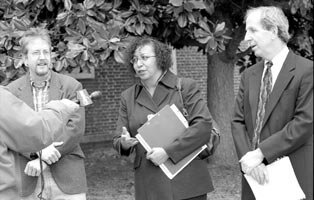>> Back to The HooK front page
NEWS- Poor and ignored? Schilling makes the case
Published March 18, 2004, in issue #0311 of The Hook
BY LISA PROVENCE
Herb Porter doesn't think his Fifeville neighborhood is well represented on City Council.
Kevin Kotlarski, co-president of the Jefferson Park Avenue Neighborhood Association, isn't sure which of the five City Councilors will be most responsive when issues come up affecting his neighborhood.
"The time we've been here, it seems folks don't feel they're being represented, especially south of town," observes Kotlarski.
City Councilor and lone Republican Rob Schilling wants to divide the city into four wards, which he says would end the rule of "elite" Democrats on City Council and encourage more lower-income candidates to run for office.
Schilling has analyzed the addresses of councilors since 1968, and concludes that affluent precincts like Recreation"the downtown power group"-- have been more likely to produce councilors than Clark or JPA on the south side of town.
"There's a vast swath in the southern part of the city that's underrepresented," he says, and that part is on the lower socio-economic end. He charges that while most city money is spent in the downtown area, the improvements are paid for by neighborhoods with skyrocketing tax assessments like Belmont, which hasn't sent anyone to Council in over two decades.
Schilling is calling for a study to change to a ward system of electing seven councilors, four from four wards and three at-large councilors.
The three Democratic candidates running for office say he's trying to fix a problem that doesn't exist.
"I'm not convinced that's best for the city and black voters," says Rose Hill resident Kendra Hamilton at a press conference the three Dems held to announce support for moving elections from May to November.
"I have reservations about the ward system," says David Brown. "Currently every citizen has five people representing him or her."
"Political posturing," scoffs Kevin Lynch of Schilling's proposal.
In January, when City Council appointed a task force to study moving the city elections to November, Schilling proposed other changes to the task force's mission: adding wards, increasing the number of councilors from five to seven, and directly electing the mayor. His plan was shot down 4-1.
Since then, he's become his own task force, attending neighborhood meetings to gauge citizen reaction to having their own councilor elected from their own ward.
And he's discovered that in 1981, a ward referendum, supported by the local NAACP, passed but a subsequent referendum on the same issue didn't in 1982.
"This is really disturbing," says Schilling. "A lot of people felt disenfranchised." A task force had recommended the referendum to elect councilors by ward, and the first vote passed the measure 2,642 to 2,418.
Schilling says City Council's attitude was, "'We don't like that vote.' They put it on the ballot again, and it failed."
Democrat John Conover was on City Council then, and he remembers both referenda as close votes. He compares changing how the city elects its councilors to changing the Constitution: "If you're going to change it, you want to be sure. The sentiment has got to be overwhelmingly in favor of making the change."
Conover says a city the size of Charlottesville is better served by at-large councilors, unlike Albemarle County, which elects supervisors by district. "Scottsville," he notes, "is a long way from Crozet."
As for a Republican like Schilling courting black voters who traditionally vote Democratic-- "I laud them if they want to appeal to the black vote," says Conover.
NAACP spokesperson Cindy Stratton says Schilling has shared information on a ward system, but has not formally approached the group for backing. Stratton is concerned about minority representation on council, and says if a different way of electing councilors came before the local chapter, "I can't imagine we'd not look at it."
Herb Porter doesn't find it strange that a Republican wants to increase representation of lower-income neighborhoods. "If a person cares about fair political representation, the political party doesn't matter," he says.
He calls Schilling "a breath of fresh air on City Council. They don't listen well. When they want your vote, they will woo you."
Porter doesn't find the councilors as accommodating after the election. "It's the unresponsiveness of Democratic City Councilors that will lead to other individuals taking their seats," he says. Two Republicans Ann Reinicke and Kenneth Jackson are running for City Council along with the three Democrats and independent Vance High.
Schilling is teaming up with Democratic Councilor Meredith Richards to host a community forum to look at wards at 7pm March 22 at Tonsler Park.
Another ward supporter, Harry Cooke, calls representation on council "a joke." A retiree, he says people like him aren't going to be able to afford Charlottesville much longer.
Cooke has lived in his Mulberry Avenue home since 1964. "Since I've been living here, I have to pay for trash, the streets are cracked, and they took a bus line away," he complains.
"I think City Council throws a lot of money away looking for glory, to be the all-American city," he says. "It's costing us."

Rob Schilling mapped where city councilors have lived the past 34 years and found richer precincts elect more councilors.
PHOTO BY JEN FARIELLO

Democratic council candidates Kevin Lynch, Kendra Hamilton and David Brown favor electing councilors in November but not by ward, as proposed by Republican Rob Schilling.
PHOTO BY JEN FARIELLO
#
>> Back to The HooK front page
|